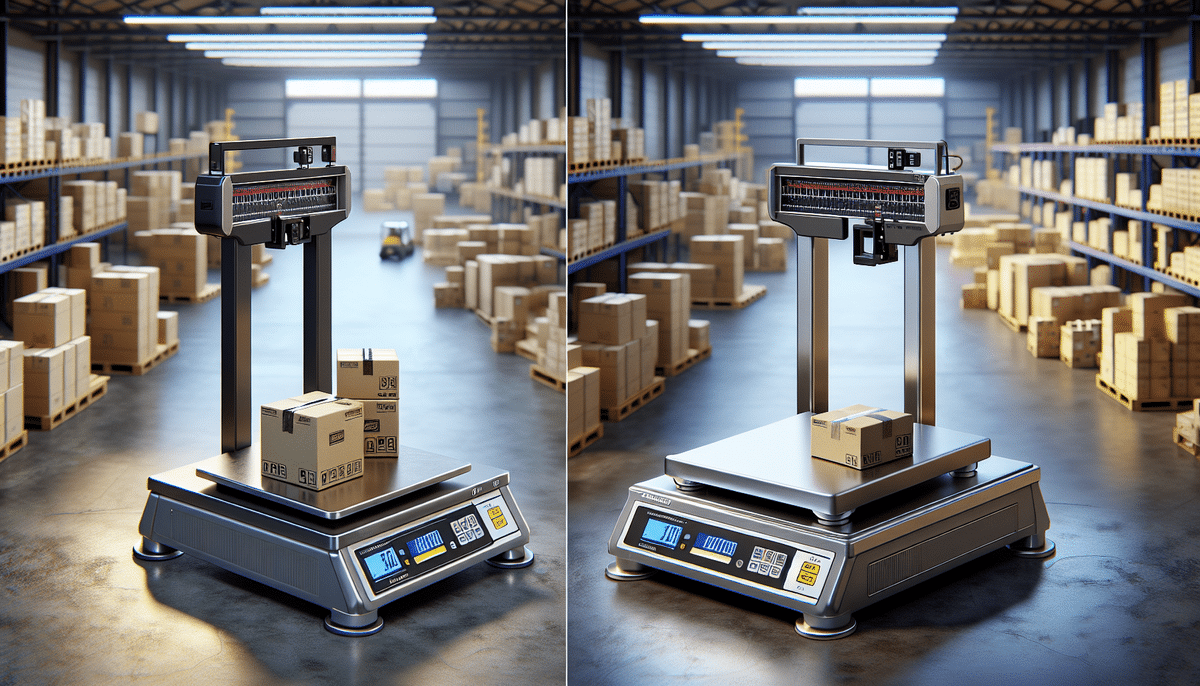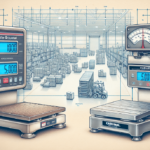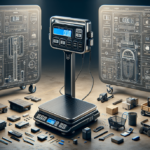Salter Brecknell PS1000 vs Ohaus D51XW: An In-Depth Comparison
If you're in the market for a platform scale, you've likely considered the Salter Brecknell PS1000 and the Ohaus D51XW. These scales are among the top choices in various industries due to their reliability and performance.
Introduction to Platform Scales
Platform scales are essential tools for weighing items that are too large or too heavy for standard scales. They are commonly utilized in industries such as manufacturing, warehousing, logistics, and more. Platform scales come in various sizes and capacities, enabling the weighing of anything from small packages to large pallets.
When selecting a platform scale, several factors should be considered, including:
- Accuracy
- Capacity
- Durability
- User-Friendliness
- Maintenance
- Price
In this article, we will compare the Salter Brecknell PS1000 and Ohaus D51XW scales based on these factors to help you determine which scale best meets your needs.
Salter Brecknell PS1000 Features
The Salter Brecknell PS1000 is a heavy-duty platform scale designed for industrial applications. Key features include:
- Capacity: Up to 1000 kg
- Accuracy: ±0.5 kg
- Construction: Durable steel with a non-slip surface
- Display: Large LCD for easy measurement reading
- Power Options: AC or battery-powered
The PS1000 boasts a robust build quality, ensuring longevity even in demanding environments. Its non-slip surface enhances safety during use, while the large LCD display allows for quick and accurate readings.
Ohaus D51XW Features
The Ohaus D51XW is a high-precision platform scale ideal for laboratory and research settings. Its standout features include:
- Capacity: Up to 5000 kg
- Accuracy: ±0.5 kg
- Construction: Stainless steel with a chemical-resistant weighing pan
- Display: Clear LCD with touchless sensor for hands-free operation
- Connectivity: USB and optional Ethernet ports for data analysis
The D51XW's stainless steel construction ensures durability and easy cleaning, making it suitable for environments that require stringent hygiene standards. Its advanced connectivity options facilitate seamless data integration and analysis.
Comparative Analysis
Accuracy
Accuracy is a critical factor when selecting a platform scale. Both the Salter Brecknell PS1000 and the Ohaus D51XW offer the same level of accuracy:
- Salter Brecknell PS1000: ±0.5 kg
- Ohaus D51XW: ±0.5 kg
Both scales are suitable for applications requiring precise measurements. The D51XW's higher capacity allows it to handle larger and heavier items without compromising accuracy.
Capacity
Capacity determines the range of weights a scale can handle:
- Salter Brecknell PS1000: Up to 1000 kg
- Ohaus D51XW: Up to 5000 kg
The D51XW significantly outperforms the PS1000 in terms of capacity, making it more suitable for industries that deal with heavier loads. Conversely, the PS1000's capacity is ample for smaller-scale operations.
Durability and Build Quality
Both scales are built to last, but there are slight differences:
- PS1000: Constructed from durable steel with a non-slip surface. It includes overload protection to prevent damage.
- D51XW: Made from stainless steel with a chemical-resistant pan. It features rugged design elements to withstand harsh industrial environments.
While both scales offer excellent durability, the D51XW's stainless steel construction provides additional resistance against chemicals and wear, making it more durable in specific industrial settings.
Ease of Use and User-Friendly Features
Both scales are designed with user-friendliness in mind:
- PS1000: Features an adjustable indicator stand and a remote display option up to 3 meters away.
- D51XW: Equipped with a touchless sensor for hands-free operation and a swivel indicator for better viewing.
The PS1000 offers remote display capabilities, enhancing visibility in large workspaces, while the D51XW's touchless sensor promotes hygiene and efficiency in laboratory settings.
Maintenance and Upkeep
Maintenance is straightforward for both scales:
- PS1000: Simple design with fewer moving parts reduces the risk of mechanical issues. Easy to clean with a damp cloth.
- D51XW: Stainless steel surface is easy to maintain, and the chemical-resistant pan simplifies cleaning.
Both scales require minimal upkeep, but the PS1000's simpler design may offer a slight advantage in terms of ease of maintenance.
Price Comparison
Pricing can vary based on suppliers and features, but generally:
- PS1000: More affordable due to lower capacity
- D51XW: Higher price point reflecting its greater capacity and advanced features
Businesses should consider their specific needs and budget when choosing between the two scales.
Industry Applications
Salter Brecknell PS1000
The PS1000 is ideal for industries requiring precise measurements of smaller to medium-sized items. Common applications include:
- Food Processing
- Laboratories
- Manufacturing
- Warehousing for small package weighing
Ohaus D51XW
The D51XW excels in environments where heavy-duty weighing is essential. Suitable industries include:
- Logistics
- Warehousing for pallet and large container weighing
- Construction
- Industrial manufacturing
Customer Reviews and Ratings
Both scales have garnered positive feedback from users:
- PS1000: Praised for its accuracy, ease of use, and robust build quality.
- D51XW: Appreciated for its high capacity, durability, and advanced connectivity options.
Some users have mentioned battery life concerns with the PS1000, but overall satisfaction remains high for both models. According to a 2023 industry survey, both scales score above 4.5 out of 5 in user reliability and performance.
Conclusion: Which Scale is Right for You?
Choosing between the Salter Brecknell PS1000 and the Ohaus D51XW depends on your specific requirements:
- Choose the PS1000: If you need a reliable scale for smaller to medium-sized items with high precision.
- Choose the D51XW: If your operations involve weighing larger, heavier items and require advanced connectivity features.
Assess your industry's specific needs, budget constraints, and desired features to make an informed decision.
Frequently Asked Questions About Platform Scales
Q: How accurate are platform scales?
A: Platform scales can be highly accurate, with some models offering precision up to ±0.1 lb (±0.05 kg). Both the PS1000 and D51XW provide a reliable accuracy of ±0.5 kg, suitable for most industrial applications.
Q: How do I maintain my platform scale?
A: Platform scales are generally low-maintenance. Regular cleaning with a damp cloth and ensuring they are kept in a dry, dust-free environment will prolong their lifespan. Refer to the manufacturer's guidelines for specific maintenance procedures.
Q: Can platform scales be calibrated?
A: Yes, regular calibration is recommended to maintain accuracy. Calibration procedures vary by model, so refer to the manufacturer's guidelines for the Salter Brecknell PS1000 and Ohaus D51XW.
Q: Can platform scales be used for legal-for-trade applications?
A: Yes, some platform scales are certified for legal-for-trade use. Ensure the scale is properly certified and regularly calibrated to comply with legal requirements. Consult with regulatory bodies or the scale manufacturers for certification details.






















